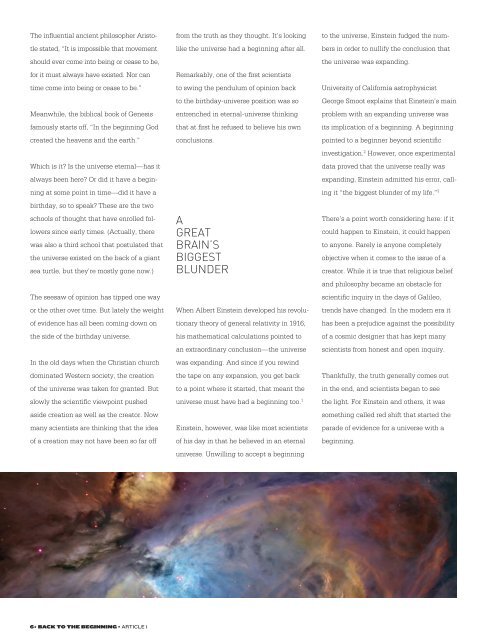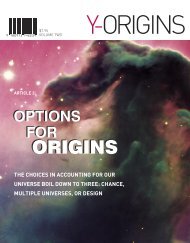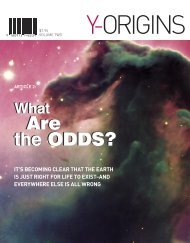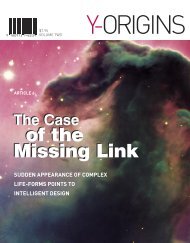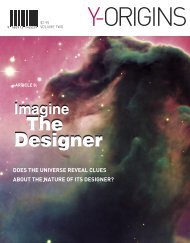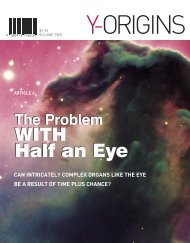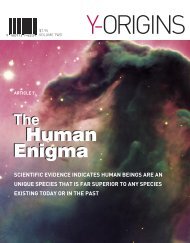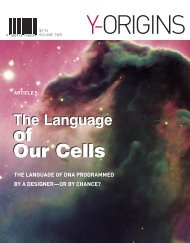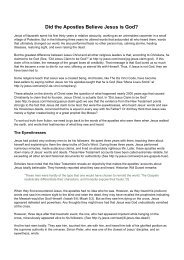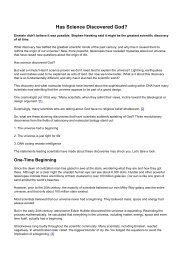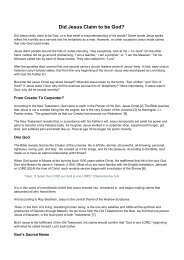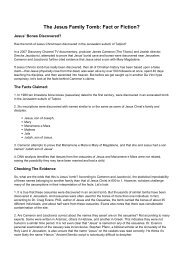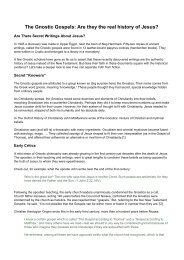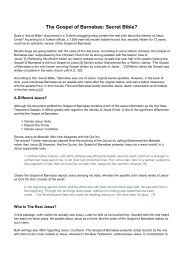Back_to_beginning1
Create successful ePaper yourself
Turn your PDF publications into a flip-book with our unique Google optimized e-Paper software.
The influential ancient philosopher Aris<strong>to</strong>tle<br />
stated, “It is impossible that movement<br />
should ever come in<strong>to</strong> being or cease <strong>to</strong> be,<br />
for it must always have existed. Nor can<br />
time come in<strong>to</strong> being or cease <strong>to</strong> be.”<br />
Meanwhile, the biblical book of Genesis<br />
famously starts off, “In the beginning God<br />
created the heavens and the earth.”<br />
Which is it? Is the universe eternal—has it<br />
always been here? Or did it have a beginning<br />
at some point in time—did it have a<br />
birthday, so <strong>to</strong> speak? These are the two<br />
schools of thought that have enrolled followers<br />
since early times. (Actually, there<br />
was also a third school that postulated that<br />
the universe existed on the back of a giant<br />
sea turtle, but they’re mostly gone now.)<br />
The seesaw of opinion has tipped one way<br />
or the other over time. But lately the weight<br />
of evidence has all been coming down on<br />
the side of the birthday universe.<br />
In the old days when the Christian church<br />
dominated Western society, the creation<br />
of the universe was taken for granted. But<br />
slowly the scientific viewpoint pushed<br />
aside creation as well as the crea<strong>to</strong>r. Now<br />
many scientists are thinking that the idea<br />
of a creation may not have been so far off<br />
from the truth as they thought. It’s looking<br />
like the universe had a beginning after all.<br />
Remarkably, one of the first scientists<br />
<strong>to</strong> swing the pendulum of opinion back<br />
<strong>to</strong> the birthday-universe position was so<br />
entrenched in eternal-universe thinking<br />
that at first he refused <strong>to</strong> believe his own<br />
conclusions.<br />
A<br />
GREAT<br />
BRAIN’S<br />
BIGGEST<br />
BLUNDER<br />
When Albert Einstein developed his revolutionary<br />
theory of general relativity in 1916,<br />
his mathematical calculations pointed <strong>to</strong><br />
an extraordinary conclusion—the universe<br />
was expanding. And since if you rewind<br />
the tape on any expansion, you get back<br />
<strong>to</strong> a point where it started, that meant the<br />
universe must have had a beginning <strong>to</strong>o. 1<br />
Einstein, however, was like most scientists<br />
of his day in that he believed in an eternal<br />
universe. Unwilling <strong>to</strong> accept a beginning<br />
<strong>to</strong> the universe, Einstein fudged the numbers<br />
in order <strong>to</strong> nullify the conclusion that<br />
the universe was expanding.<br />
University of California astrophysicist<br />
George Smoot explains that Einstein’s main<br />
problem with an expanding universe was<br />
its implication of a beginning. A beginning<br />
pointed <strong>to</strong> a beginner beyond scientific<br />
investigation. 2 However, once experimental<br />
data proved that the universe really was<br />
expanding, Einstein admitted his error, calling<br />
it “the biggest blunder of my life.” 3<br />
There’s a point worth considering here: if it<br />
could happen <strong>to</strong> Einstein, it could happen<br />
<strong>to</strong> anyone. Rarely is anyone completely<br />
objective when it comes <strong>to</strong> the issue of a<br />
crea<strong>to</strong>r. While it is true that religious belief<br />
and philosophy became an obstacle for<br />
scientific inquiry in the days of Galileo,<br />
trends have changed. In the modern era it<br />
has been a prejudice against the possibility<br />
of a cosmic designer that has kept many<br />
scientists from honest and open inquiry.<br />
Thankfully, the truth generally comes out<br />
in the end, and scientists began <strong>to</strong> see<br />
the light. For Einstein and others, it was<br />
something called red shift that started the<br />
parade of evidence for a universe with a<br />
beginning.<br />
6• BACK TO THE BEGINNING • ARTICLE 1


